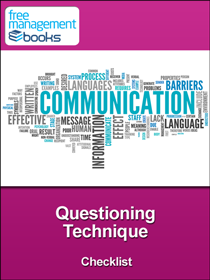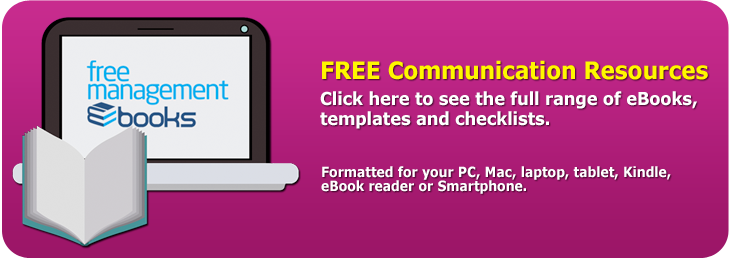Questioning Technique Checklist
 |
||
 |
||
This checklist gives you five reasons to focus on developing your questioning technique. It also explores the different types of questions you can use during your communications highlighting the most effective way to use each one.
Communication is an essential skill for any management professional and effectively use questions plays a significant role in this success. This checklist gives you five reasons to focus on developing your questioning technique. It also explores the different types of questions you can use during your communications highlighting the most effective way to use each one.
Every communication you have must have a clear and precise objective without this confusion and misunderstandings will occur. For your questioning technique to be effective you must actively listen to the exchange and remove all distractions from the conversation.
![]()
![]()
By developing your skill in asking 'searching' questions you will be able to draw out the information that demonstrates your message has been clearly understood and will be acted on appropriately.
Developing your Questioning Technique
All communication is a two-way process and a critical part of that exchange is the ability to clarify that you have been understood in the way you intended. Using questions is one of the most effective ways to achieve this.
There are five reasons why developing your questions skills will promote your career aspirations. They are that
1. You have been understood as you intended.
2. Your attention is 100% focused on the exchange.
3. You are actively listening throughout the communication.
4. You gain the appropriate commitment from the other party.
5. Issues associated with your communication objective are fully explored.
Whether you need to clarify understanding, gain commitment or to overcome objections learning which type of question will best achieve your aim is essential for a successful manager.
Questioning Techniques
There are seven different types of questioning techniques that you can use to ensure you communicate successfully. The best situation for each technique is described below and includes a few examples of each question type.
As you become more familiar with how and when to use the different style of questions your communication skills will enable you need to achieve your goals more easily. It is important that the type of question you use reflects the circumstances of the conversation.
Your skill in this area will increase with practice and your willingness to reflect on how well your questioning technique achieved the aim of your communication. Your reflection does not need to be complex, simply ask yourself the five statements below.
1) Define what you want to attain from the conversation - Information, Intelligence or Action?
2) Decide the most efficient way to achieve this - Enquiry, Probing or Directing?
3) Adapt verbal and non-verbal signals to suit each questioning technique used.
4) Be flexible actively listen to responses and respond accordingly to ensure your aim is attained.
5) With hindsight would you change anything?
The answers you get will ensure you portray the appropriate behavior and develop a strong questioning competency.
Open Questions
This style of question usually begins with why, what, where, which and how. They are most effective once a conversation is established and are frequently used to gather the information needed to attain your aim.
You should not appear judgmental, nor give the impression you are expecting a particular reply! For example:
'How helpful was that procedure?'
'What did you do to resolve the problem?'
'Why did you react to the customer's concerns in that way?'
Closed questions
These are questions that require a 'Yes' or 'No' answer. They are useful in drawing an issue to a conclusion and controlling conversations so that pertinent information is exchanged rather than personal views.
Too many closed questions will affect the flow and rapport, but in some instances an affirmative or negative answer helps summarize what has been discussed. For example:
'Where you aware that procedure had not been followed?'
'Was the customer happy with this result?'
'Did you know of this situation before?'
Probing questions
This technique is extremely useful in drawing out additional information and clarifying your understanding is correct of what you have heard. It is very effective in uncovering details that otherwise would have been overlooked or considered irrelevant.
It is important that your body language is perceived as supportive or neutral. If not, the exchange could come across as an interrogation rather than a discussion. For example:
'What would you have done differently?'
'Could you be more specific?'
'Who is involved in this situation?'
'Why do you think that?'
'How would someone outside the organization describe this situation?'
'What are your concerns?'
Leading questions
This type of question is best used in situations where you need to influence people's thinking or want to draw out a certain answer from someone. They are especially useful in training situations where you can guide an individual to see the importance of performing a task in a set way. For example:
'Do you think it would have been better to…?'
'Shouldn't we have done this instead?'
Be careful not to over use this technique as it can undermine your ability to empathize and build rapport.
Reflective questions
When you need to review a situation asking questions that enable an individual to reflect on how things could have been done differently is extremely useful. Reflective questions allow manager's to ask why an individual felt or acted a certain way without having to express an interpretation of the event.
Also by using exactly the same words in your question that you just heard gives the other person the opportunity to explore their knowledge of the situation. For example:
'You describe the situation as 'making you annoyed' why is that?'
''When you describe the other team 'as being disparaging' what do you mean?'
Hypothetical questions
Management are often faced with situations where they need to gauge how others in their team might act or think. Using the technique of asking a hypothetical question is an excellent way to discern this.
This sort of question offers individuals the opportunity to speculate and think about alternative ways to conduct a task. It also encourages people to propose new approaches or ideas to resolve an issue. For example:
'If you had no constraints how would you approach…?'
'Have you thought about what would happen if…?'
Paraphrasing questions
Another useful technique managers can use to check their understanding of what has been described or said to them is paraphrasing. This skill is especially useful when needing to draw an agenda item to a close and bring everyone's focus back to the purpose of the meeting.
This is where you rephrase what has just been said to you in such away that you are able to check you comprehension of the problem is correct. For example:
'So, by receiving the statistics from the IT department on the day you asked for them you would be able to meet your deadline. Is that correct?'
'The cause of each defect is due to the quality of goods supplied by X and if they meet the service level agreement the defects would disappear? Can you confirm this would be the case?


